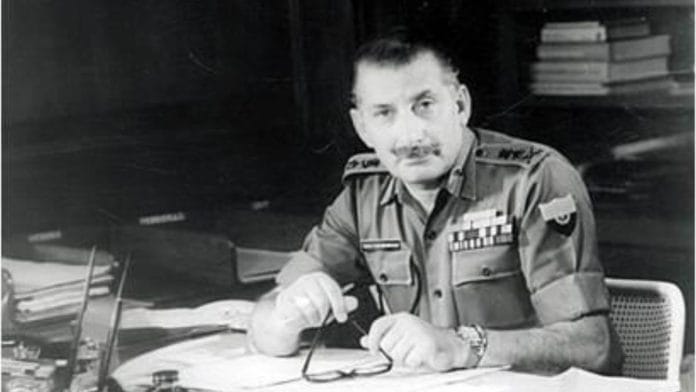In 1942, a young Sam Manekshaw was shot several times during the battle at Sittang Bridge in erstwhile Burma. Seeing that the young Captain was unlikely to survive, Maj Gen DT Cowan pinned his own Military Cross on Manekshaw for his valour. Nearly three decades later, Manekshaw led the Indian Army to victory in the Bangladesh Liberation War in December 1971.
The legend of India’s first Field Marshal has grown in the decades since the 1971 war, with the recent movie Sam Bahadur (2023) being the latest to showcase his gallantry and leadership as an officer. However, behind the famed army chief was a family man with a mischievous streak.
“He was mischievous and imaginative. His sense of mischief without malice is what allowed his sense of humour to become legendary,” Maja Daruwala, his daughter and chief editor of the India Justice Report, told ThePrint.
As a child, Manekshaw once “got it into his head” that due to his green eyes and fair skin tone, he was not a son of his family—a statement he made to his cook, which led to a stern reprimand from his mother, Daruwala fondly recollected.
One of Manekshaw’s enduring facets was his “unending enthusiasm” and his inability to mistrust people, Daruwala said. His self-deprecating humour helped others around him feel comfortable and at ease.
His humour never left him, even as he grew through the officer ranks of the Indian Army, eventually becoming the Chief of Army Staff (COAS) in June 1969.
When Manekshaw was injured at the battle of Sittang Bridge, he was asked by an Australian doctor treating his wounds what had happened. “A bloody mule kicked me,“ said Manekshaw. The comment bowled over the doctor, who responded, “You might be worth saving!”
Family man
Born Sam Hormusji Framji Jamshedji Manekshaw in Amritsar on 3 April 1914, he was the fifth of six children. He studied at Sherwood College in Nainital before joining the Indian Military Academy (IMA) in 1932 as a part of its first batch of 40 gentlemen cadets. Nicknamed “The Pioneers”, the batch included General Smith Dun and General Mohammed Musa Khan, both of whom rose to lead the armies of Burma (now Myanmar) and Pakistan respectively.
Manekshaw’s daughter Sherry Batliwala said that theirs was a tight-knit family.
“He and his siblings were all family-oriented. He was a friend as much as a father. You could talk to him about anything at all,” Batliwala said.
In 1939, Manekshaw married Silloo Bode and had two daughters, Maja and Sherry. He loved dogs, enjoyed gardening, fishing, and horse racing. His enthusiasm for these activities was embraced by the entire family.
His granddaughter Brandy Batliwala, who spent many summers at Stavka—his home in Coonoor—remembers him spending hours responding to every letter he received, be it from fans, colleagues, or others.
“The one thing he imbibed in me was his discipline. In the mornings, he would keep busy with responding to the letters. He would spend hours gardening, and would spend 20 days a month travelling for work,” Brandy said.
Manekshaw told Brandy the name of almost every rose in the famed garden, along with how to care for each one of them. The Field Marshal also enjoyed cooking, barbecuing in particular, and would often banter with his cooks over the food.
He had the ability to freely interact with everyone he met. He bantered with everyone from his chauffeurs to the clerks at grocery stores in Coonoor.
Also read: Ali Akbar Khan’s father disowned him for composing film music. This movie changed his mind
‘007 Sam’
Manekshaw’s mischief shone through his life. When the family watched a James Bond movie together, he took to skulking around the house, popping out every now and then, and announcing himself as “Sam, 007 Sam”, Daruwala said. He also developed a “detective persona”, using it to write letters to his daughters when they were in school.
His keen sense of fashion was a constant. Manekshaw was always dressed well, in a suit or a jacket, regardless of whether he had a meeting. According to Daruwala, he was a “dapper” dresser who loved his shoes.
The Field Marshal was not always friendly with politicians, with his sarcasm and fame leading to suspicions that he would take the dive into politics at some point. However, when quizzed by his granddaughter, he made it clear that he never had any intention to do so.
“Look, you must always do what you are good at doing, not because someone believes you should. You should do something keeping in mind your integrity and dignity,” he said to Brandy.
Manekshaw didn’t allow fame and recognition to change him.
“It is a burden that people who have exceptional fame have to bear. You get so much praise, but even as you accept it, you have to recognise that you often don’t have the luxury of having honest conversations. He was conscious of this and would laugh with us and say, ‘With three women in the family, I can’t get a swollen head, that’s for sure,’” Daruwala said.
After retiring from the army, Manekshaw transitioned to being a member on several boards of Indian corporations. Never one to coast on his rank, he prepared his own notes and presentations for every meeting and was actively involved in the role, Brandy said. Till his death on 27 June 2008, he kept himself busy.
Even in his last days of life, Manekshaw retained his enthusiasm for life, telling the doctors, “I am okay.” They were the last words he ever spoke.
(Edited by Prasanna Bachchhav)






